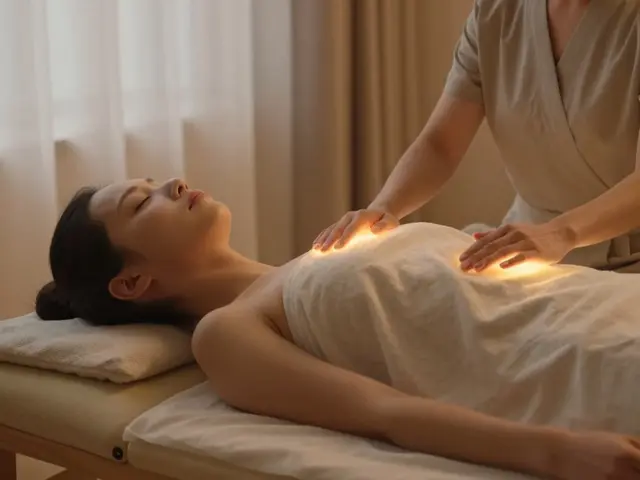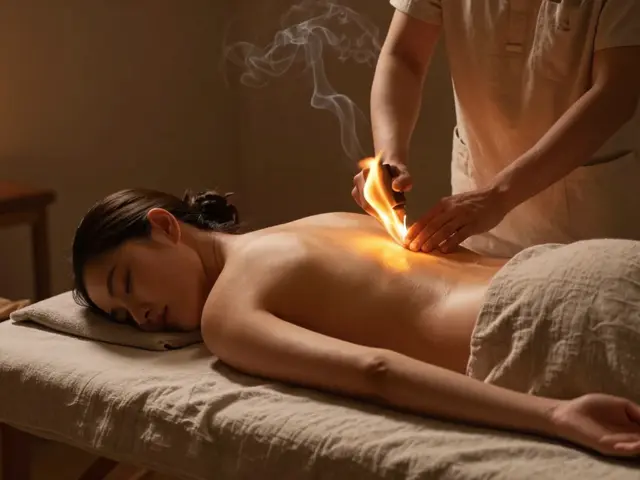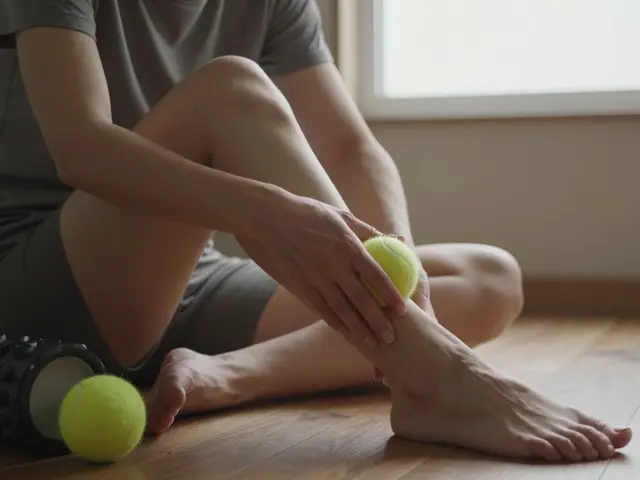Expecting a baby is an exciting journey, but it often comes with its fair share of aches, anxiety, and sleepless nights. Prenatal massage has emerged as a powerful tool for alleviating some of these common pregnancy woes.
Mood swings and emotional sensitivity can be overwhelming during pregnancy due to hormonal changes. A gentle massage can help release endorphins, which uplift your mood and provide much-needed emotional relief.
Moreover, sleep disturbances can be a struggle for expectant mothers. Prenatal massage aids in promoting better sleep by reducing muscle tension and enhancing relaxation, making it easier to drift into a restful slumber.
When considering prenatal massage, it's important to understand the best techniques and safety precautions. Always consult with a qualified therapist who specializes in pregnancy care to ensure a safe and beneficial experience.
- Introduction to Prenatal Massage
- Mood Improvement Through Prenatal Massage
- Sleep Benefits of Prenatal Massage
- Best Techniques for Prenatal Massage
- Safety Tips for Pregnant Women
- Finding a Qualified Therapist
Introduction to Prenatal Massage
When you think about preparing for a baby, packing the hospital bag and setting up the nursery might come to mind. But another aspect that's gaining popularity is prenatal massage. This isn’t just any massage; it's a therapeutic technique specifically designed for pregnant women. The goal is to alleviate the unique physical and emotional challenges that come with pregnancy.
Pregnancy alters your body in significant ways. You endure backaches, swelling, and even mood swings. Regular massages can offer immense relief. Research suggests that prenatal massage helps lower cortisol levels, the hormone associated with stress. Lower cortisol means less anxiety, which is a big deal when you’re expecting.
One thing to note is that prenatal massage isn't a modern invention. It has roots in ancient practices. Historical records show that women have been using touch therapies for centuries, long before massage parlors existed. Today, modern medical experts often recommend it as a complementary approach to traditional prenatal care.
You'll find specialized massage techniques focus on key areas such as the back, legs, and feet. Positioning is crucial, ensuring that both mother and baby are comfortable and safe. Pillows and special cushions are often used to support various parts of the body during the massage, minimizing pressure and maximizing comfort.
Dr. Tiffany Field, a renowned researcher, states, “Prenatal massage not only helps in reducing anxiety and depression in pregnant women but also contributes to an overall sense of well-being.”
“Prenatal massage not only helps in reducing anxiety and depression in pregnant women but also contributes to an overall sense of well-being.” – Dr. Tiffany Field
Interested in trying it out? It's important to find a certified prenatal massage therapist. These professionals are trained to address the specific needs of pregnant women. They know which areas to avoid and which techniques to employ to ensure a safe and beneficial experience.
Benefits Highlight
The benefits are numerous. Beyond stress relief, prenatal massages can help improve circulation and reduce swelling. Improved blood flow means better oxygen and nutrients for both mom and baby. This kind of massage also helps in better lymphatic drainage, reducing fluid retention and swelling in the hands and feet.
Mood and Emotional Support
On top of physical benefits, there are emotional perks too. The nurturing touch of a skilled massage therapist can help pregnant women feel more connected to their changing bodies. This emotional support is invaluable, contributing to a more positive pregnancy experience.
In summary, incorporating prenatal massage into your prenatal care routine can offer widespread benefits. From reducing physical discomfort to offering emotional support, it's an investment in your well-being that pays off both during pregnancy and post-delivery.
Mood Improvement Through Prenatal Massage
One of the most remarkable benefits of prenatal massage is its ability to lift your spirits during pregnancy. Pregnancy is a time of immense physiological and emotional changes. Hormones such as progesterone and estrogen surge, leading to mood swings and heightened emotions. Prenatal massage can significantly ameliorate these feelings by encouraging the release of endorphins, the body's natural 'feel-good' chemicals.
Endorphins interact with receptors in the brain to reduce the perception of pain and trigger a positive feeling in the body, similar to that of morphine. This chemical release can transform your emotional state, easing anxiety and depression, which are often exacerbated during pregnancy. According to a study published in the Journal of Psychosomatic Obstetrics & Gynecology, women who received regular prenatal massages reported a 56% reduction in depression symptoms after just five weeks of treatment.
Besides the hormonal impact, the act of physical touch itself plays a crucial role in emotional well-being. Human touch can create a nurturing and caring environment, important for emotional stability during pregnancy. Prenatal massage focuses on areas that typically hold tension, such as the lower back, shoulders, and hips. By relieving tension in these areas, the body can achieve a more relaxed and balanced state.
Reducing stress and anxiety during pregnancy is not just beneficial for the mother; it also positively impacts the unborn child. Elevated maternal stress levels have been linked to preterm births and low birth weights. By incorporating regular prenatal massages, you not only care for your well-being but also contribute to your baby's health. Dr. Tiffany Field, a pioneering researcher in prenatal massage, states, 'Massage therapy has been shown to reduce stress hormones in both the mother and the infant, thus promoting healthier pregnancies.'
Many women also report an increased sense of connection with their baby during a prenatal massage session. This bonding experience helps reinforce the emotional bond between mother and child, aiding in emotional and psychological preparedness for parenthood. This nurturing environment can also ease the apprehensions that often accompany impending childbirth.
A regulated regimen of prenatal massage can also aid in improving self-image. Pregnancy often brings changes in body shape and size that can affect a woman's self-esteem. Feeling good in your own skin and taking time to nurture yourself can work wonders for your mood. A survey by the American Pregnancy Association noted that 82% of women felt more confident and optimistic about their pregnancies after consistent prenatal massages.
Given its significant emotional benefits, prenatal massage can be a safe haven in the stormy seas of pregnancy emotions. Whether it's through the release of endorphins, reduction of stress hormones, or simply the comfort of touch, this practice offers a holistic approach to tackling mood swings and emotional stagnation during pregnancy.

Sleep Benefits of Prenatal Massage
Many expectant mothers struggle with getting a good night's sleep as their pregnancy progresses. From physical discomfort to heightened anxiety, the reasons for sleep disturbances are varied. Fortunately, prenatal massage offers a range of benefits that can significantly improve sleep quality.
One of the most noticeable ways prenatal massage helps with sleep is by reducing muscle tension. As the body prepares to accommodate a growing baby, muscles and joints can become strained. Regular massages help to ease this tension, making it easier to find a comfortable sleeping position. This physical relaxation directly translates to better sleep.
In addition to physical relief, prenatal massage promotes the release of endorphins—natural chemicals in the body that help to alleviate stress and improve mood. Lower stress levels make it easier to fall asleep and stay asleep throughout the night. During a prenatal massage, the body's parasympathetic nervous system is activated, which is responsible for relaxation and rest. This creates an ideal state for achieving deep, restorative sleep.
A significant study published in the Journal of Psychosomatic Obstetrics & Gynecology found that pregnant women who received regular massages reported a 70% improvement in sleep quality. Participants noted reductions in sleep interruptions and improvements in overall restfulness. These statistics confirm the effectiveness of prenatal massage in enhancing sleep.
Apart from these immediate benefits, prenatal massages also help in reducing swelling and improving blood circulation, which are common issues that disrupt sleep during pregnancy. Better circulation means that oxygen and nutrients are efficiently delivered throughout the body, promoting overall wellness and making it easier to sleep comfortably.
According to Dr. Tiffany Field, director of the Touch Research Institute at the University of Miami, "Prenatal massage not only helps reduce back pain and improve sleep, but it also lowers levels of the stress hormone cortisol."
Another crucial benefit is the reduction of pregnancy-related pain, like lower back pain and sciatic nerve pain. Addressing these specific pain points through massage therapy provides immediate relief and helps pregnant women to enjoy uninterrupted sleep. Specialized techniques are often employed to target these areas, ensuring that massages are both safe and effective.
It's essential to consult with a knowledgeable massage therapist who specializes in prenatal care to reap these benefits safely. A therapist trained in prenatal massage will understand how to tailor the session to the unique needs of pregnant women, ensuring a safe and beneficial experience that can improve sleep quality remarkably.
Best Techniques for Prenatal Massage
When it comes to prenatal massage, specific techniques can make a world of difference for expecting mothers. One of the most popular methods is the side-lying position. This approach ensures maximum comfort and safety for both mother and baby. A massaging therapist will usually use pillows to support the head, belly, and between the knees, which helps to alleviate lower back pain.
Another effective technique involves light, rhythmic strokes known as effleurage. This method is ideal for promoting relaxation and improving blood circulation. It's gentle enough to avoid causing any discomfort while still providing significant relief from stress and muscle tension. Therapists often focus on areas prone to holding tension, such as the shoulders, neck, and lower back.
Swedish massage, modified for pregnancy, is also highly recommended. This method uses long, gliding strokes and kneading to ease muscle tension and improve cardiovascular health. According to a study published in the Journal of Psychosomatic Obstetrics & Gynecology, Swedish massage can significantly reduce anxiety levels and improve sleep quality in pregnant women.
A well-known obstetrician, Dr. Sarah Little, once mentioned, “Prenatal massage can be very beneficial for expecting mothers, as it helps to reduce stress hormones and increase dopamine and serotonin levels, which naturally lift the mood and improve sleep.”
Some therapists also incorporate techniques from reflexology. This involves applying pressure on specific points on the feet, hands, and ears, which are believed to correspond to different organs and systems in the body. Reflexology can help alleviate symptoms like nausea, fatigue, and even headaches. Many pregnant women find this approach to be incredibly relaxing and beneficial.
It's crucial to emphasize that only certified therapists with specialized training in prenatal care should perform these massages. They are knowledgeable about the appropriate techniques and pressures, ensuring the mother's and baby's safety. Before beginning any massage regimen, it's always a good idea to consult with a healthcare provider to address any concerns.
Hydrotherapy massage is another technique worth exploring. It involves the use of water to provide a soothing and zero-gravity environment, reducing joint strain. This method can be particularly helpful during the third trimester when physical stress and discomfort are at their peak. A hydrotherapy session can significantly reduce swelling and promote better sleep quality.
Using Prenatal Massage at Home
If visiting a professional therapist isn't an option, there are still ways to benefit from prenatal massage at home. A partner can assist by using gentle techniques, focusing on areas like the lower back, feet, and shoulders. Using a pregnancy pillow for side-lying support can enhance comfort and safety. Additionally, incorporating essentials oils, like lavender or chamomile, can boost the calming effects of the massage.

Safety Tips for Pregnant Women
When it comes to prenatal massage, safety is paramount. Expecting mothers need to consider several factors to ensure that both they and their babies remain safe and comfortable throughout the massage session. Here are some essential safety tips to keep in mind.
First, always consult with your healthcare provider before starting any new treatment, including prenatal massage. Your doctor can offer personalized advice based on your medical history and current health status.
Another important aspect is to choose a certified and experienced therapist who specializes in prenatal massage. These professionals are trained to know the best techniques and positions that are safe for pregnant women. Avoid deep tissue massage and instead, opt for gentler techniques that focus on relaxation rather than deep muscle manipulation.
Prenatal massage should generally avoid certain body parts, such as the abdomen, due to the sensitivity and risk to the unborn baby. Concentrating on areas like the lower back, hips, and legs can be particularly beneficial while reducing any potential risks.
It's also crucial to use appropriate body positioning. Lying flat on your back is not recommended during pregnancy because it can put pressure on major blood vessels and reduce blood flow to your baby. Instead, lie on your side or use a specifically designed pregnancy massage table with belly support.
According to the American Pregnancy Association, “The safety and effectiveness of massage during pregnancy depends considerably on the training and experience of the therapist and the timing and length of the massage.”
One more tip is to be mindful of the duration of each session. Prenatal massages should typically last no longer than an hour to avoid prolonged periods of lying down, which can become uncomfortable and strain your body.
Oil or lotion used during the massage should be pregnancy-safe and free from essential oils that might not be suitable for expectant mothers. Consult with your therapist on the ingredients to ensure they are non-toxic and hypoallergenic.
Lastly, listen to your body. If anything during the massage feels uncomfortable or painful, speak up immediately. The goal is to provide relief and relaxation, not to cause further distress or discomfort.
By following these tips, you can make the most out of your prenatal massage sessions, ensuring they are both safe and highly beneficial. Always remember to consult your doctor and choose the right therapist to make your massage experience a positive one.
Finding a Qualified Therapist
Finding a therapist who specializes in prenatal massage is crucial for expecting mothers seeking the numerous benefits this practice offers. The first step is to ensure the therapist holds a certification in prenatal massage from a reputable institution. This certification indicates that they have received specific training to handle the unique needs and sensitivities of pregnant women.
Avoid therapists who do not have specialized training in prenatal care. Pregnant women have unique physiological changes, such as increased abdominal pressure and changes in body alignment, which require a professional who understands how to manage these safely. Look for therapists who are knowledgeable about the appropriate techniques and positions that are safe for different stages of pregnancy.
“Prenatal massage is not just about relaxation; it’s about addressing specific needs that your body only experiences during pregnancy,” says Dr. Marissa Henshaw, a certified prenatal massage expert.Furthermore, always check reviews and testimonials from other pregnant women who have used their services. Positive reviews are a good indicator of the therapist’s reliability and effectiveness. Sometimes, personal recommendations from friends or family can also be invaluable.
It's important to have an initial consultation with the therapist before scheduling regular sessions. During this consultation, discuss your specific needs, any discomforts you're experiencing, and any medical conditions. The therapist should ask you detailed questions about your pregnancy and note any contraindications that might prevent certain massage techniques. Be wary of any therapist who doesn't take the time to understand your unique situation.
An experienced therapist should also provide a comfortable and safe environment for the massage. They should use appropriate support pillows and know how to position you correctly to ensure that you and your baby are both safe and comfortable throughout the session. The use of hypoallergenic oils and lotions should be standard practice to prevent any allergic reactions.
Price can also be an indicator of the therapist's qualification. While it’s tempting to go for the cheapest option, remember that you often get what you pay for. Investing in a quality prenatal massage with a certified professional can make a significant difference in your mood and sleep quality, ultimately making your pregnancy more enjoyable.
Feel free to ask about the therapist’s experience and how long they have been practicing prenatal massage. Those with several years of experience are more likely to provide a safe and effective massage. Additionally, some therapists may also be members of professional massage organizations, which can give you extra peace of mind regarding their qualifications.
For a quick reference, here's a checklist for finding the right therapist:
- Certified in prenatal massage
- Positive reviews and testimonials
- Initial consultation offered
- Comfortable and safe massage environment
- Hypoallergenic oils and lotions
- Reasonable but reflective pricing
- Experience and professional affiliations
Finding a qualified prenatal massage therapist takes a bit of research, but the benefits are well worth the effort. Properly done prenatal massage can significantly improve mood and sleep quality, making your pregnancy journey smoother and more enjoyable.










